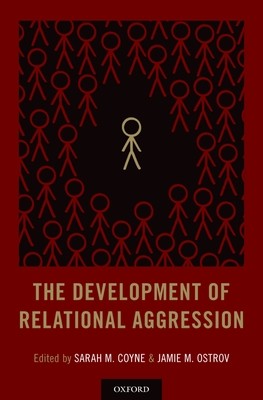
- We will send in 10–14 business days.
- Publisher: Oxford University Press, USA
- ISBN-10: 0190491825
- ISBN-13: 9780190491826
- Format: 15.8 x 23.6 x 3.3 cm, kieti viršeliai
- Language: English
- SAVE -10% with code: EXTRA
The Development of Relational Aggression (e-book) (used book) | bookbook.eu
Reviews
Description
Research over the last few decades has revealed that individuals use a variety of mechanisms to hurt one another, many of which are not physical in nature. In this volume, editors Sarah M. Coyne and Jamie M. Ostrov turn their focus on relational aggression, behavior that is intended to cause harm to another individual's relationships or social standing in the group (e.g., gossiping, social exclusion, and spreading malicious rumors). Unlike physical aggression, the scars of relational aggression are more difficult to detect. However, victims (and their aggressors) may experience strong and long-lasting consequences, including reduced self-esteem, loneliness, depression, anxiety, and more.
Over the past 25 years, there has been a growing body of literature on relational aggression and other non-physical forms of aggression that have focused predominantly on gender differences, development, and risk and protective factors. In this volume, the focus turns to the development of relational aggression during childhood, adolescence, and emerging adulthood. Here, Coyne, Ostrov, and their contributing authors examine a number of risk factors and socializing agents or models (e.g., parenting, peers, media, the classroom) that lead to the development of relational aggression over time. An understanding of how these behaviors develop will inform readers of important intervention strategies to curb the use of relational aggression in schools, peer groups, and in family relationships. The Development of Relational Aggression provides scholars, researchers, practitioners, students, and parents with an extensive resource that will help move the field forward in our understanding of the development of relational aggression for the future.EXTRA 10 % discount with code: EXTRA
The promotion ends in 21d.08:49:23
The discount code is valid when purchasing from 10 €. Discounts do not stack.
- Publisher: Oxford University Press, USA
- ISBN-10: 0190491825
- ISBN-13: 9780190491826
- Format: 15.8 x 23.6 x 3.3 cm, kieti viršeliai
- Language: English English
Research over the last few decades has revealed that individuals use a variety of mechanisms to hurt one another, many of which are not physical in nature. In this volume, editors Sarah M. Coyne and Jamie M. Ostrov turn their focus on relational aggression, behavior that is intended to cause harm to another individual's relationships or social standing in the group (e.g., gossiping, social exclusion, and spreading malicious rumors). Unlike physical aggression, the scars of relational aggression are more difficult to detect. However, victims (and their aggressors) may experience strong and long-lasting consequences, including reduced self-esteem, loneliness, depression, anxiety, and more.
Over the past 25 years, there has been a growing body of literature on relational aggression and other non-physical forms of aggression that have focused predominantly on gender differences, development, and risk and protective factors. In this volume, the focus turns to the development of relational aggression during childhood, adolescence, and emerging adulthood. Here, Coyne, Ostrov, and their contributing authors examine a number of risk factors and socializing agents or models (e.g., parenting, peers, media, the classroom) that lead to the development of relational aggression over time. An understanding of how these behaviors develop will inform readers of important intervention strategies to curb the use of relational aggression in schools, peer groups, and in family relationships. The Development of Relational Aggression provides scholars, researchers, practitioners, students, and parents with an extensive resource that will help move the field forward in our understanding of the development of relational aggression for the future.

Reviews